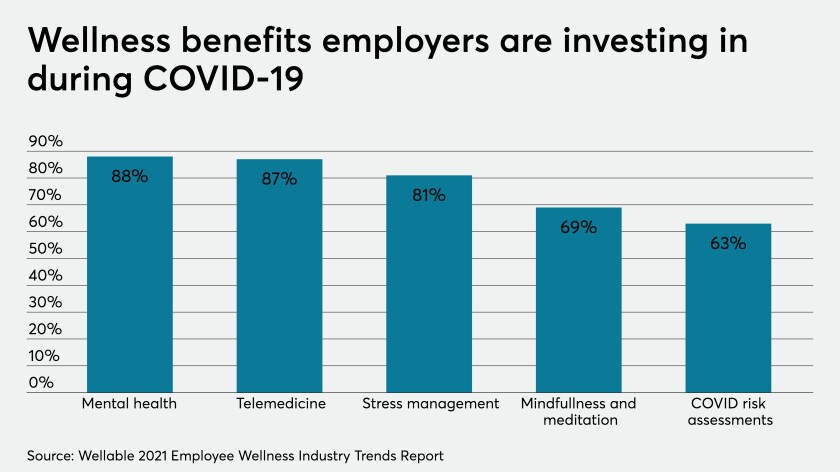Employers are rethinking wellness benefits for 2021, focusing on mental health services and incorporating virtual offerings.
A survey by benefits provider Wellable found that 37% of employers plan to invest more of their budget toward wellness in 2021. Eighty-eight percent plan to add more mental health resources, 87% are upping their resources for telemedicine services and 81% are increasing benefits that target stress management.
Read more: Employee mental health is plummeting one year into the pandemic
Employee wellness has been a major area of concern throughout the pandemic, as stress, depression and anxiety have plagued employees. December marked the lowest levels of employee well-being since the start of COVID-19, according to the Mental Health Index by Total Brain and the National Alliance of Healthcare Purchaser Coalitions.
“Organizations need to reevaluate their definition of wellness and how they can make a difference in employee lives,” Brighid Courtney, director of the study, said in a statement. “Building wellness programs that actually meet employee needs can be difficult in the most reliable of times, but this task has become exponentially more complicated.”
Traditionally, wellness benefits have been underused by employees: while 79% of employers offer an EAP program, utilization rates average around 5%, according to the Business Group on Health.
But throughout the pandemic, employers have expanded their benefit offerings to keep employees healthy, productive and happy while working remotely. More than a quarter of employers have ramped up their benefits in response to the challenges of COVID-19, according to Fidelity Investments.
As the pandemic continues, the Wellable survey found that previously in-demand benefits like gym memberships, free food and biometric screenings were being phased out of employer budgets this year, due to safety concerns and office closures. Employers have swapped these popular perks for virtual alternatives, like at-home meal delivery and virtual fitness programs.
Ensuring employees know what’s available to them is a critical step to guaranteeing they take advantage of these programs, says Kathleen O'Driscoll, vice president of Business Group on Health.
“Even before coronavirus, employers were really focusing on the mental health and well-being of their workforce,” O'Driscoll says. “An EAP program is almost like a foundational block that many of them use to provide access to virtual sessions and other benefits available to them.”
Read more: Pandemic PTO: Why ‘staycations’ are vital to employee mental health
Overall, employees are grateful for the support from their employer: 64% of employees said they are very satisfied with their employer’s response to COVID, and 97% said their manager had been a source of support, according to research from consulting firm Robert Half.
“Authentic care is the most impactful resource an employer can offer,” says Reetu Sandhu, senior manager of the Limeade Institute. “Have open conversations in supporting employee well-being. Communicate that you take it seriously and want to support it in a serious way.”


